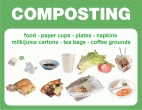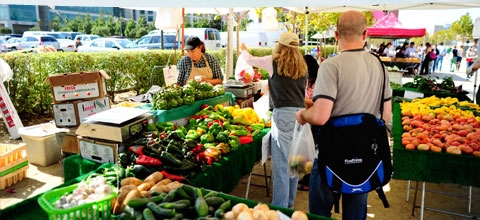Can I introduce the unappetizing topic of hospital food? Hospitals are notorious for not practicing what they preach in their own food service operations. Their food vendors provided fruits and vegetables that were overcooked, over-sugared, over-salted and ready-to-eat. By “leaving the cooking to them,” vendors made cafeterias more profitable by eliminating labor-intensive, freshly prepared meals. Kitchens replaced skilled cooks with untrained staff who rarely needed paring knives except for opening, reheating and disposing of packaging. Fortunately, sustainability goals are helping hospitals (like school cafeterias) undergo menu reform to make more local, fresh options available for their staff, visitors and patients.
Kaiser Permanente, a leader in the reform movement since 2003, has established 50 farmers’ markets at their facilities. A recent survey published in Journal of Agriculture, Food Systems, and Community Development (subscription required) found that 74 percent of patrons surveyed at Kaiser Permanente markets consume more fruits and vegetables as a result of shopping there, and 71 percent indicated that they were eating a greater variety of fruits and vegetables.
Gail Lee, UCSF’s Sustainability Manager, credits UC Office of the President for inspiring each campus and medical center food service operation to achieve their goal of procuring 20 percent sustainable food products by the year 2020. UCSF started weekly farmers’ markets at the Mission Bay campus from April to November and at the Parnassus campus year round. UCSF is working towards achieving zero food waste by 2020, having implemented post customer compost/recycling programs at 100 percent of their food service locations last year. 
I am proud to be joining Gail’s team to help implement the UC goals. UC Davis was recently declared a “cool school,” but UCSF is well on the way to becoming a nationally recognized “cool hospital” and research campus.
This is good news for those of us who prefer fresh fruit salad to canned fruit cocktail, in spite of the fact that fruit cocktail was a UC Berkeley invention. Professor William Cruess was looking for a way to use the small, wasted bits left over after canning fruit. In his defense, I have to remind myself that the alternative for many parts of the nation in that decade was no fruit at all. He saw fruit spoil in the orchards because what was true then is still true today — California produces much more fruit than locals can possibly eat. Let’s not forget to eat our share of the local bounty.

